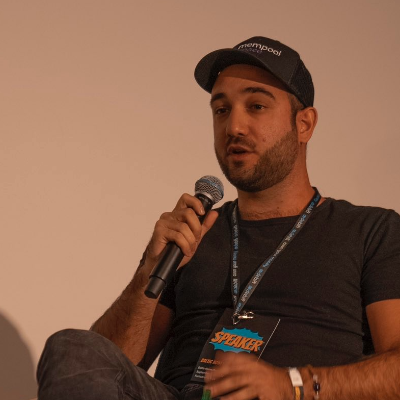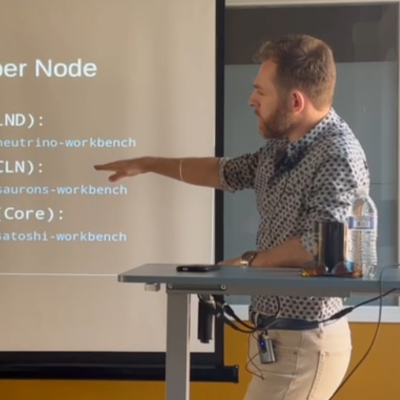
Upcoming talks at bitcoin++ Austin 2024, bitcoin script edition, May 1 →4, 2024


You're probably aware that v0.3.1 of Bitcoin disabled numerous Script opcodes, most famously OP_CAT. Bringing them back unlocks a great deal of power, and there are a few additional opcodes that complement them well in a modern Bitcoin system (such as key addition). This talk aims to present a coherent model for making Bitcoin Script as capable as I think it can be, while avoiding the pitfalls which caused it to be hobbled in the first place.
Venue: Main Stage

Blockstream

Coming Soon!
Venue: Main Stage

Fairgate

Ken Sedgwick will discuss the goals and challenges of running the Validating Lightning Signer (VLS) on embedded hardware devices.
Venue: Talks Stage

Validating Lightning Signer

Join Hiro’s engineers to get your node synced, so you’ll be ready for building a bitcoin indexer or building on a full node for the hackathon later in the week!
Venue: Workshops

Hiro Systems

What is a covenant? What are the challenges around adding this functionality to bitcoin? Join a panel of experts led by the legendary Jusneth as we dig into defining the different proposals for covenant updates and the tradeoffs around each of them.
Venue: Main Stage

Bitcoin OG

Taproot Wizards


Blockstream

Open Source @ NYDIG

If it compiles, it can be verified in Bitcoin script. We'll show how a covenant addition to Bitcoin could power up Tapscript to enable verification of arbitrary computation, and other good stuff.
Venue: Main Stage

Open Source @ NYDIG

BIP324 is Bitcoin's new P2P transport protocol which features opportunistic encryption, a mild bandwidth reduction, and the ability to negotiate upgrades before exchanging application messages. We'll look into the intuition behind constructing the initial v2 handshake between nodes and encryption schemes used for constructing network messages.
Venue: Talks Stage

Bitcoin Explorer

Using only OP_CAT and BIP340/341 schnorr signatures, you can do a surprising amount of transaction introspection in bitcoin script. In this talk, we explore the mathematics and mechanics of the technique, and see some sample applications with code and a discussion of the tradeoffs and considerations.
Venue: Main Stage

Taproot Wizards

Easily setting up a configurable lightning node in cloud or local system with VLS, CLBOSS, etc. by using docker containers. SETUP REQUIRED: We need to have a docker installation on the system. Reference can be taken from official docker documentation: https://docs.docker.com/engine/install/
Venue: Talks Stage

Validating Lightning Signer

Does Bitcoin have gas fees? No but there are limits to execution built-in to the scripting system. In this talk, we’ll get into how Bitcoin measures and rate-limits CPU usage of scripts by talking about the sigops limit!
Venue: Main Stage

Base58⛓️🔓

Status update on development of the Ark layer-two protocol.
Venue: Talks Stage

Ark

A quick overview of the TXHASH covenant proposal"
Venue: Main Stage

Ark

Transaction pinning is potential threat to many multi-party protocols such as lightning. Yet it's also an economic exploit: miners are leaving money on the table. Here we'll look at replace-by-fee-rate, an incentives-based solution to pinning that both fixes the problem, and earns miners more money.
Venue: Talks Stage

OpenTimestamps

Bitcoin aims to provide a decentralized, private, secure, and unstoppable currency. However, the Lightning Network has faced challenges in meeting these goals. We will explore how BOLT12 addresses these issues and the technical details that enable its functionality.
Venue: Main Stage

Spiral

We'll start with a look at the greater Bitcoin JDK ecosystem and a brief intro to modern (2024+), functional-style Java. We'll compare modern Java with Rust and look at how Rust libraries can be used in Java. We'll introduce the new secp256k1-jdk API and its implementation using libsecp256k1 and the Foreign Function & Memory API ("Panama"). We'll also look at the refactored bitcoinj 0.17 and beyond.
Venue: Talks Stage

bitcoinj

Bitcoin has lots of scalability problems, from payments to ownership, and so much more. We'll break down why bitcoin has troubles scaling and how we may or may not be able to fix it.
Venue: Main Stage

Mutiny Wallet

A hands-on introduction to the use of connectors and Winternitz signatures to locate errors in a chain of hashes. This mechanism allows for challenging arbitrary computations on Bitcoin using BitVMX, paving the way for a more decentralized connection with Rootstock.
Venue: Talks Stage

Rootstock Labs

The Lightning Development Kit (LDK) lets developers efficiently build Lightning applications. LDK is a comprehensive, open-source Lightning implementation used by dozens of projects including Lightspark, Mutiny, Cash App, and BitKit. Conor Okus will outline the SDK's capabilities, LDK Node, Lightning Network services compatible with LDK, and the current development roadmap.
Venue: Main Stage

Spiral

An overview of SV2: history, why, what, how, and roadmap. Also some hands-on activity where the audience sets up pools and CPU miners.
Venue: Talks Stage

Vinteum Grantee

Metaprotocols built on Bitcoin such as the Taproot Assets Protocol define new rules for transactions containing specific committed metadata (eg: a new leaf in the tapscript tree). A sub-class of these protocols in the client-side validation paradigm rely on special nodes that validate these transaction with auxiliary information to overlay a new consensus system on top of Bitcoin. However as Bitcoin Script isn't aware of these meta protocols, it's possible to mine a transaction that is valid for Bitcoin consensus, but invalid from the PoV of a metaprotocol. In this talk, we'll explore how we can use covenants to incrementally make Bitcoin Script aware of these metaprotocols, which unlocks the door to new scaling solution and expressibility on Bitcoin.
Venue: Main Stage

Lightning Labs

Lessons Learned & Insights Gained On How We'll Finally Keep Developers Around
Venue: Main Stage

BitScript

One of the biggest pain points we see from developers building on Bitcoin is indexing the chain. Many devs have to maintain their own index of blockchain chainstate, which can incur high storage costs and be challenging to keep up to date. Re-orgs of chainstate happen often, and every time there’s a re-org, you have to re-index the entire chain, which can be a time-intensive process. At Hiro, we built an open source indexing engine (Chainhook) that enables anyone to build consistent, reorg-proof databases that index only the information you want— creating a lighter-weight index. In this workshop, we'll show you how to create individual "chainhooks" to filter and trigger specific actions based on on-chain events.
Venue: Talks Stage

Hiro Systems

Escrow: the everyday, unseen guardian of almost every transaction. Discover how BitEscrow elevates crucial security with innovative, non-custodial reversible transactions — powered by our APIs and SDKs — shaping the future of Bitcoin transactions.
Venue: Main Stage

BitEscrow

Presentation about Miniscript Fragments, Types, and Properties
Venue: Main Stage

AnchorWatch

Ark brings Bitcoin lending to reality: why would I borrow Bitcoin?
Venue: Talks Stage

Vulpem Ventures

Diving into Miniscript doesn't have to be daunting. In this talk you'll learn the basics of the Miniscript language, the benefits of using it over traditional Bitcoin Script, and how you can use it in your own applications. I'll also share the challenges I encountered with existing Miniscript libraries and explain the motivation for developing my own.
Venue: Main Stage

Blockstream // Greenlight

A talk about the latest “scripting” language coming to Core Lightning to help make complex splices a reality for lightning!
Venue: Talks Stage

core-lightning

We will discuss how complex scripting could look like with different covenant opcodes. Note: This is not an endorsement of any opcode proposal.
Venue: Main Stage

Block

A forward and backward look at the ways various covenant proposals overlap, interact, and sometimes do surprising things. We'll touch on SIGHASH_ANYPREVOUT (BIP118), OP_CHECKTEMPLATEVERIFY (BIP119), OP_CHECKSIGFROMSTACK(VERIFY), OP_VAULT(RECOVER) (BIP345), OP_CHECKCONTRACTVERIFY, and OP_CAT. Did you know that OP_VAULT is recursive? Did you know that OP_CHECKTEMPLATEVERIFY+OP_CHECKSIGFROMSTACK has many of the same benefits as SIGHASH_ANYPREVOUT and then some bonuses? Can OP_CAT alone enable Lightning Symmetry channels? These questions and more will be answered as we explore quirky covenants.
Venue: Talks Stage


The scripting landscape is quickly evolving, and along with it the tools for
Venue: Main Stage

core-lightning

BitScript

BitEscrow

AnchorWatch

Simplicity is the future of Bitcoin smart contracts. The language brings arbitrary computation without loops and formal correctness to the blockchain. However, Simplicity is hard to write, like Assembly. Simphony is a high-level language, like Rust, that compiles to Simplicity. In my talk, I will introduce you to Simphony and to the web IDE that runs Simphony in the browser. Start Simplicity development today on your phone!
Venue: Talks Stage

Blockstream Research

What is sighash_noinput? Where did it come from? How did it come to be known as APO? In this talk Blockstream’s Christian Decker will walk us through the the evolution of BIP118 over the years, giving us a good picture of where the proposal stands now.
Venue: Main Stage

Blockstream // Greenlight

Locking your coins up into a vault is one proposal for updating script (OP_VAULT). How does this work and why should you
Venue: Talks Stage

Fedi

In 2021, Jeremy Rubin showed that it is possible to do 32-bit Lamport signatures in Bitcoin Script, without any changes to the network. This development, while independently interesting for some oracle applications, has really shown its value by its use in BitVM, an aggressively ambitious project by Robin Linus to do arbitrary computations in Script by splitting them across dozens of transactions indexing billion-entry Merkle trees. The core idea is that we can think of Lamport signatures as indexing a sort of "global key-value store" supporting single writes and erasures, where each entry has an owner. We discuss this idea, as well as how it generalizes using OP_CAT beyond 32-bit values to "real" signatures, commitments to Merkle trees, and more.
Venue: Main Stage

Blockstream Research

Why it can be useful to make outputs impossible to spend after a deadline, and how we can make this reasonably reorg safe.
Venue: Talks Stage

OpenTimestamps

Write coinjoin software and learn the scripts that help you do it
Venue: Main Stage
Independent

A guided tour through a series of protocols that are compatible with FROST: proactive secret sharing, Taproot and BIP32 key tweaking, participant enrollment/disenrollment, share repairability, MuSig2 nesting, and adaptor signatures.
Venue: Talks Stage

Bitkey

How to go from idea to Bitcoin smart contracts using OP_CHECKCONTRACTVERIFY
Venue: Main Stage

Ledger

Venue: Main Stage

Venue: Main Stage

Venue: Main Stage

Venue: Main Stage

Venue: Main Stage

Mutiny Wallet

Unchained Capital

Fedi

Venue: Main Stage

core-lightning
Independent

bitcoin++

Pleb Underground